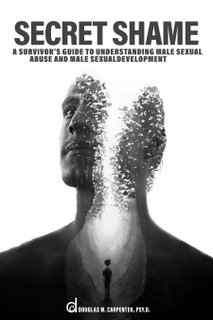The Secret Shame of Male Sexual Abuse
/Dr. Doug Carpenter is the author of the book, Secret Shame: A Survivor’s Guide to Understanding Male Sexual Abuse and Male Sexual Development. He is a Licensed Psychologist in the state of Michigan. He and his wife, Mary Carpenter, LMSW; are the founders of Insight Counseling Services. Dr. Carpenter has a doctoral degree in Clinical Psychology from Forest Institute of Professional Psychology; earned a Master of Science in Counseling and Substance Abuse Rehabilitation from Pace University; and has an Associate of Arts in Theological Studies from Kent Christian College. Dr. Carpenter has extensive study and therapeutic skills in the area of gender role conflict, shame, sexual abuse and trauma, and chemical and behavioral addictions. You can find more information about his counseling services at http://www.insightcounselingpc.com/. This article is printed with the permission of Dr. Carpenter.
A famous psychologist, Carl Jung, said that “Shame is a soul eating disease.” Sexual abuse is the secret shame that lies deep within boys and men. For decades, the focus of sexual abuse research, educational programs, and media has been on the suffering of females. There has been much less attention given to the effects of sexual abuse on males.
Men who have experienced sexual abuse deserve to be heard and to heal! The wounded inner child deserves to be comforted and protected, and the adult deserves to be free of the impact of sexual abuse and move into living a happy life free of emotional, physical, relational, and sexual dysfunction and compulsivity.
The effects of sexual abuse are vast and individualistic. There are commonalities, such as sexual identity confusion. However, the degree it affects a man on an individual basis is limitless. The American Psychological Association reports that 40% of men who are sexually abused will experience no ill effect. However, that leaves 60% of men who will have some problems ranging from mild to severe. The research identifies that men wait anywhere from 20-26 years before telling anyone about their abuse - think of all the issues boys carry from childhood into their adult lives. Few boys report sexual abuse as it is occurring or shortly after. Chapter 9 of my book, Secret Shame: A Survivor’s Guide to Understanding Male Sexual Abuse and Male Sexual Development, examines over 30 reasons why men do not disclose their sexual abuse.
At some point, a boy or man may choose to disclose a small snippet of his abuse. The reaction of the person whom they tell has significant implications on their decision to continue telling their story or return to the deep cloistered cave of secret shame. The mental grappling a man goes through concerning disclosure is a significant struggle. This decision is as significant, if not more, than all other decisions in life such as whom to marry, where to live, and what career to pursue.
The man needs to explore how the abuse changed his thinking and behavior. A good majority of men were abused before puberty. The research identified that men on average are abused around the age of eight or nine. This is considered the latency stage of development where boys are focused on learning and growing in their skills to navigate the world around them. Issues of a sexual nature are supposed to be dormant between the ages of 6 until puberty. The disruption of this phase by sexual abuse or exposure to sexually explicit material such as pornography creates a stirring of sexual curiosity and desire that is prematurely awakened and disrupts the maturational process.
Sexual abuse interferes with the natural process of imprinting and the development of a healthy sexual template. Our initial sexual experiences form a mental imprint, these sexual experiences are written on a blank canvas and become the template the mind compares and returns to when further sexual thoughts, feelings, and experiences occur. Most individuals can remember their first sexual experience, wanted and unwanted, in fairly great detail. Sexual abuse and exposure to sexually explicit materials take the sexual template awry. Early awakenings of sexual material can significantly increase sexual curiosity to unhealthy levels and encourage seeking out sexual information via unhealthy means.
At times, the abuse was so traumatic the boy used the defenses of dissociation and repression to survive. In these instances, the mind struggles to remember the details of the event or has absolutely no memories. This can result in Post Traumatic Stress Disorder and associated symptoms such as flashbacks, intrusive thoughts, and body memories. No matter the degree of trauma, the contents of the event are stamped into the sexual template of the mind in either a conscious or unconscious format. Both formats impact the future mental, emotional, and sexual functioning of the individual. Learning has occurred as a result of the event and neural synapses were formed. These become the road map for sexual arousal patterns.
Sexual identity confusion is the number one issue faced by sexually abused males. Adolescence is considered a time of storm and stress along a normal continuum of development. Adding sexual abuse and trauma only compounds the stressful work that occurs during this era of life. Children and adolescents lack the cognitive skills to understand what is happening to them and how they arrived in an abusive situation. They cannot make meaning of the abuse.
A significant step in the healing process is understanding the automatic process of the human response cycle. The male body responds to visual cues and physical stimulation. The male body cannot decipher between abuse, sex, and intimacy. This process leaves a boy confused about his body. Why did it respond to another male? Why did I feel both scared and excited? Why did my body betray me and respond to another man when it is only supposed to respond to a female concerning sex? Why did I get an erection? Why did I ejaculate? Many boys and men struggle with believing their bodies betrayed them at a crucial point in their life. This creates a plethora of deep questions about their sexuality and masculinity. Many sexually abused males report the sense of having their masculinity robbed from them as a result of the abuse and that it somehow feminized them.
Why me? This is a question asked by all survivors. Another important step in the healing process is understanding the manipulative characteristics of the perpetrator. Sexual abuse did not just happen! It is a well-thought-out, calculated, manipulative plan on the part of the abuser. The perpetrator has a keen awareness of the vulnerabilities of the child and knows how to gradually begin taking advantage of these weaknesses. The abuser maneuvers himself into a place of importance in the child’s life. The child begins to trust him, depend on him, and may even love him before the sexual abuse begins. Before long, the child is confused about the deep love and appreciation he has for a person who now changes the relationship into something sexual. Someone the child thought was helpful, is now hurtful instead. Unfortunately, the perpetrator is so cunning that he finds a way to convince the child that it is their fault or they initiated it. This adds to the deep confusion of the child and the feelings of being trapped. Self-blame becomes a paramount issue for the child which only leads to further sexual identity confusion and significant issues concerning self-esteem, self-hatred, and self-loathing. The abuse permeates the very fiber of the child’s existence and he makes false attributions about himself. This begins the roots of shame that only deepens and festers throughout the psyche of the abused.
Male sexual abuse has a high risk of creating an array of sexual problems. Many times, men do not even understand the connection between their abuse and their problematic adult patterns of behavior. It may lead to complete abstinence from sexual and romantic relationships. On the other hand, the early awakening of these desires can lead to problematic relationships with pornography and sexual addiction. The research also shows a correlation between sexual abuse and later sexual dysfunction.
There are many barriers to the healing process for men. Sexually abused individuals are likely to develop negative coping skills to numb the pain that lies within. This can manifest through drugs, alcohol, sexual addiction, gaming, gambling, overeating, self-injury, even suicide. The abuse creates several problems that need to be addressed. In fact, it is often a side effect of the abuse, such as addiction, that lands a person in treatment where the sexual abuse is then disclosed as the root of his problems.
Successful treatment for sexually abused men involves several steps. First, the man must be able to let go of the masculine veneer he hides behind. He must get in touch with his feelings, make himself vulnerable, be willing to share his story, and first accept that he was a victim. He must stop the self-blame and accept that his perpetrator was a masterful manipulator. Children cannot consent to sexual acts. The second stage in healing is being able to take the facts and make meaning of the events. The man comes to understand his childhood vulnerabilities and how the perpetrator took advantage of those. He may also come to understand more about the perpetrator’s life and why or how he became an abuser. The man accepts that he survived the abuse. Third, the man makes healthier choices for his life. He begins moving from being a survivor into being a thriver. He identifies healthy coping skills and implements them into his daily life. He increases his overall self-care physically, mentally, emotionally, socially, and sexually. Lastly, he begins to engage in healthy relationships with others. This happens through forming healthy male and female friendships, pursuing healthy and authentic love relationships, staying connected to an accountability partner, therapist, and/or group of people where he can share and live authentically as himself and eventually can use his story to help others. He frees himself from the shame he has lived in for many years.
© 2022 Dr. Doug Carpenter, Psy.D., L.P. This article was printed with permission.
Actor images used under license with www.shutterstock.com.







